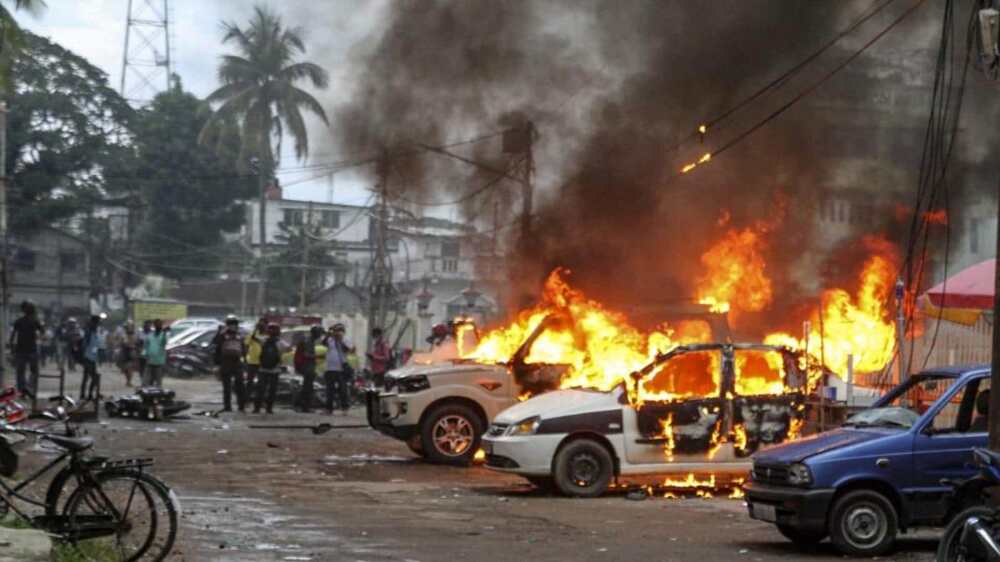A disturbing precedent

Love and hatred have no boundaries. They spill over from one place to another. But the spillover is not an independent phenomenon and is largely dependent on the environment that prevails across. What is happening in Bangladesh is highly condemnable, but the subsequent violence in Tripura should be condemned in no less harsh words. And beyond that, strict actions should be taken against the perpetrators of hatred and violence on religious grounds. Tripura is one of the states in India that has largely kept itself away from communal violence. Its nine per cent Muslim population have had a very cordial existence all throughout history. It appears that following the cowardly incidences of violence in Bangladesh, miscreants have found an opportunity in Tripura as well to perpetuate their hate agenda in the state. Is the Bangladesh violence the only thing that is fueling disturbances in the state? Certainly not. Two other separate factors are propelling the state of affairs in the state to a disturbing level. Firstly, the inter-party politics in the state is heading towards a dynamic shift. In fact, it has already stepped into it. The Bharatiya Janata Party made its mark in the state in 2018 by replacing the Manik Sarkar-led Left Front Government. At the same time, Trinamool Congress also appears to be attempting to set its footprint in Tripura. Though the next assembly elections are to be held in 2023, the tensions are on the rise from now itself as the rival parties strive to consolidate their long-term base in the state. Given the demographic composition of Tripura, and the different factions of population that the TMC and the BJP tend to have an appeal with, polarisation on the account of political divisions cannot be discounted as one of the factors fueling the unrest. Demographically, Tripura can roughly be seen, for the present context, as comprising three sections — a good majority of Bengali-speaking Hindus, the original tribal population of the state and the Muslims. The ground for dominance of Bengali Hindus was laid way back in pre-colonial times during the reigns of the last tribal rulers of the state. They had a more than liberal approach towards the influx of 'outsiders' in the state. At the present, the tribals are somewhat pushed to the sidelines and keep resisting for their interests. Before Indian independence, both Bengali-speaking Hindus and Muslims had a fairly proportional representation in the overall demography of the state. Eventually, many of the Muslim families moved to adjoining East Pakistan over the years, leaving the Muslim population to be limited at around nine per cent in the state. Until now, the real rift in the state has been between tribals and non-tribals. The emerging communal angle merits a critical look. Are the recent communal violence incidents a one-time phenomenon, or indicative of a new disturbing reality? Surprisingly, the BJP government in the state has maintained that there is no communal tension in the state. It has also refuted the claims of mosques being vandalised in particular cases. Ironically, at the same time, the state government has also announced compensation for those affected during the violent incidents. Overall, as per the government, the situation is 'normal' in the state. The second factor that has added to the worsening of the situation is rumour-mongering and the propagation of fake news. Over the past few years, there have been numerous instances where propagation of fake news has dangerously extrapolated sensitive issues involving the masses. Sadly, there appears to be no solution in sight for this threat. The whole system of fake news is rarely completely loose. It is most of the time well-organised and well-directed. In the present case, the rampant allegations and counter-allegations of spreading fake news has not only had an inflammatory effect on the overall situation, but has also put a cloud of ambiguities that paves the way for directionless decision-making. Communication is indeed a very powerful tool which, if left for indiscriminate use by negative elements, could lead to disastrous consequences. There has to be more clear regulation to put a check on misinformation spreaders. To sum up, the state government must come up very hard on the elements that are involved in deliberately spreading violence and fake news to suit their vested interests. To reiterate the Utopian idea once again, the political parties must abstain from political opportunism at the cost of people's safety and social harmony. It is a matter of shame that we have hit such a low that we are involved in vandalising mosques and idols. We collectively need to come out of this embarrassment, sooner.



